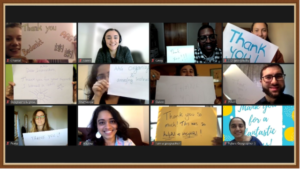Geographers do their research at a distance, build their toolkits… and find community
Scaling up AAG’s Support for Students and Early-Career Geographers
By Julaiti Nilupaer and Coline Dony
By definition, geographers study such a variety of places and spaces. Some choose to do their research about geographies near their university, and others are drawn to distant geographies. These choices were seriously challenged or derailed during the 2020-2021 academic year, which coincided with the rise of COVID-19.

“Focus group discussions and oral history interviews have been put on a halt. The pandemic and lockdown has made fieldwork impossible.”
“My dissertation proposal includes interviews and focus groups, all interaction moved online, getting attention is difficult.”
“The plan was in-person landscape analysis & participant observation of historic Black spaces and I cannot due to IRB guidelines.”
“This process has been very challenging for me given the isolation and precariousness of the funding situation.”
These are just a sampling from among more than 800 graduate students who registered for at least one of the limited-capacity workshops in the “AAG Learning Series for Graduate Students.” Many also shared feelings of extreme isolation, beyond the already-difficult isolation graduate students often confront; some felt obstructed in the research they had planned, proposed, defended, or already started; some felt disoriented as their programs faced budgetary cuts, their travel plans were cancelled, or their advisors asked them to change research topics or questions; some experienced all of the above or had set graduate school aside to shift their entire focus to personal circumstances.
Learning Series for Graduate Students (2020-2021)
In the Spring of 2020, two AAG members – Brittany Lauren Wheeler (Clark University) and Dydia DeLyser (California State University, Fullerton) – volunteered for AAG’s COVID-19 Rapid Response Task Force. They had the foresight to see these challenges approaching. Wheeler and DeLyser co-wrote a proposal for the Task Force that suggested a “Methods Training program” to support graduate students in adapting their research to the new realities of pandemic life. Their idea turned into the Learning Series for Graduate Students, a virtual series accessible to graduate students with an AAG membership. With the help of a Selection Committee, a CFP was developed to call upon instructors to propose virtual workshops and seminars. The selection committee was composed of faculty at all levels and a graduate student: Lindsay Naylor (Chair, University of Delaware), Dydia DeLyser (California State University, Fullerton), Adriana E. Martinez (Southern Illinois University Edwardsville), Skye Naslund (University of Washington), and Yuqin Jiang (University of South Carolina). They selected 14 proposal ideas out of 28.
The 12 completed workshops and seminars in the series thus far, have served some 10% of AAG’s graduate student membership, or a total of 243 graduate students. During these workshops, graduate student participants gained or advanced their knowledge and skills in writing, mixed-methods research, qualitative research; used social media and its data; or learned to work with different tools, such as Jupyter Notebook, Google Colab, GeoPandas, SaTScan, ATLAS.ti, Miro, Google Maps, and ArcGIS StoryMaps. Besides that, each offering had a social or networking component, which allowed students to connect with each other. Their experiences were generally positive (see the photo below, find more student quotes here, and Tweets related to the #GradResearchDuringCOVID# here).

The series also included two workshops offered by Beverley Mullings and Linda Peake, who are among the co-founders of the AAG Mental Health Affinity Group. Although they did not cover a geography method, the selection committee for the series wanted to add workshops on mental health and acknowledge that what was being asked of our community of graduate students was more than just to simply “adapt” their research during the pandemic: they also needed support for maintaining their mental health and wellbeing.
Throughout this program, the geographers in training have shown resilience and perseverance, openness to sharing their struggles with others, and the fortitude to see past the precious time they felt was lost.
Building Your Geographer’s Toolkit and Community (2022)
The 2020-2021 COVID-19 Task Force program barely reached the tip of the iceberg. Only 1 in 4 registrants gained access, due to the limited seats. The good news is that the AAG Council renewed and increased funding for this program for 2022.
To scale this program up, AAG is taking a number of steps in the coming months. For example, we plan to create several selection committees (instead of just one), each with a particular focus, such as computational methods, and methods for qualitative data, mixed data, collecting data, visualizing data, and so on.
The renewed program could also potentially create offerings for new audiences, such as recently graduated students in non-academic jobs who are looking to continue to receive career advice, learn new tools, hear about the unique perspective they can bring in terms of advocacy or professional ethics, and most of all, keep in touch with a community of geographers.
To make sure graduate students are involved in this program beyond just being workshop participants, AAG is building this scaled-up program with input and support from the AAG Graduate Student Affinity Group (GSAG). AAG is also thinking about funding Graduate-Led Working Groups and hiring an AAG Graduate Intern to help facilitate the program.
AAG is planning an all-day event on Friday, September 10, 2021. If you have ideas, suggestions, or are interested in being involved in this program as a graduate student, instructor, selection committee member, or as an AAG Specialty Group leader, find more details and how to register at this link (free for anyone, members and non-members).
“The whole world turned upside down in the last year, and none of us are untouched,” said Gary Langham, our Executive Director. And yet, invoking former AAG president Will Graf’s favorite line, Gary reminds us, “it’s a good day for Geography.” Indeed, we believe, and we strive to lighten up another day, for another young geographer, who belongs to our global community of geographers.
DOI: 10.14433/2017.0098


